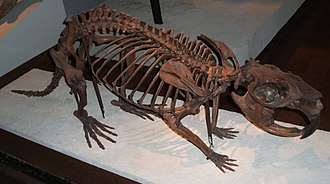Beaver
Beaver (Castor) is a genus of large, primarily nocturnal, semi-aquatic rodents. Beavers are known for building dams, canals, and lodges (homes). They are the second-largest rodent in the world (after the capybara). Their colonies create one or more dams to provide still, deep water to protect against predators, and to float food and building material. The North American beaver (Castor canadensis) and the Eurasian beaver (Castor fiber) are the only two extant species. Beavers are known for their natural trait of building dams on rivers and streams, and their ability to drastically alter the environment to create wetlands beneficial for both themselves and many other species.
Description
Beavers have a head-and-body length of 74 to 90 cm (29 to 35 in), a tail length of 25 to 35 cm (9.8 to 13.8 in), and a mass of 16 to 30 kg (35 to 66 lb). They possess large incisors that are used to cut trees and other plant materials that they use both for building and as food. Beavers have a thick fur coat that protects them from cold waters. They have webbed hind-feet, and a large, flat, and scaly tail, which is used for propulsion in the water, for support on land, and to signal danger when slapped on the water surface.
Habitat and Distribution
Beavers are found in North America and Eurasia. Castor canadensis inhabits parts of North America, while Castor fiber is found in parts of Eurasia. They prefer freshwater habitats such as rivers, streams, lakes, and ponds. Beavers are adaptable and can thrive in a variety of environments but they require trees for food and construction material, and water bodies that are suitable for dam-building.
Behavior
Beavers are highly skilled natural engineers. They construct their homes, known as lodges, out of branches, mud, and rocks; these lodges have underwater entrances, making them difficult for predators to breach. Beavers are social animals, living in family groups called colonies. These colonies work together to build and maintain dams and lodges. Beavers are mainly nocturnal and are excellent swimmers. Their diet consists primarily of tree bark and cambium, the soft tissue that grows under the bark of a tree. However, they also eat leaves, roots, and aquatic plants.
Ecological Impact
The ecological impact of beavers is significant. By building dams, beavers create wetlands, which can help to restore depleted water tables and provide habitat for many species including fish, birds, and amphibians. These wetlands can also help to filter and purify water. However, beaver activity can sometimes conflict with human interests, such as when dams cause flooding of agricultural land or damage to timber resources.
Conservation
The conservation status of beavers has varied over time and by location. Both species were heavily trapped for their fur and castoreum, a secretion used in perfumes and medicines, leading to significant declines in their populations. Conservation efforts, including legal protection, habitat restoration, and reintroduction programs, have helped to recover beaver populations in many areas. However, they are still considered a nuisance in some regions due to their dam-building activities.
See Also
Transform your life with W8MD's budget GLP-1 injections from $125.
W8MD offers a medical weight loss program to lose weight in Philadelphia. Our physician-supervised medical weight loss provides:
- Most insurances accepted or discounted self-pay rates. We will obtain insurance prior authorizations if needed.
- Generic GLP1 weight loss injections from $125 for the starting dose.
- Also offer prescription weight loss medications including Phentermine, Qsymia, Diethylpropion, Contrave etc.
NYC weight loss doctor appointments
Start your NYC weight loss journey today at our NYC medical weight loss and Philadelphia medical weight loss clinics.
- Call 718-946-5500 to lose weight in NYC or for medical weight loss in Philadelphia 215-676-2334.
- Tags:NYC medical weight loss, Philadelphia lose weight Zepbound NYC, Budget GLP1 weight loss injections, Wegovy Philadelphia, Wegovy NYC, Philadelphia medical weight loss, Brookly weight loss and Wegovy NYC
|
WikiMD's Wellness Encyclopedia |
| Let Food Be Thy Medicine Medicine Thy Food - Hippocrates |
Medical Disclaimer: WikiMD is not a substitute for professional medical advice. The information on WikiMD is provided as an information resource only, may be incorrect, outdated or misleading, and is not to be used or relied on for any diagnostic or treatment purposes. Please consult your health care provider before making any healthcare decisions or for guidance about a specific medical condition. WikiMD expressly disclaims responsibility, and shall have no liability, for any damages, loss, injury, or liability whatsoever suffered as a result of your reliance on the information contained in this site. By visiting this site you agree to the foregoing terms and conditions, which may from time to time be changed or supplemented by WikiMD. If you do not agree to the foregoing terms and conditions, you should not enter or use this site. See full disclaimer.
Credits:Most images are courtesy of Wikimedia commons, and templates, categories Wikipedia, licensed under CC BY SA or similar.
Contributors: Prab R. Tumpati, MD




